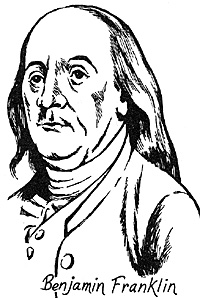
Benjamin Franklin is one of my favorite historical figures. He was wise, pragmatic and wealthy. He loved women, enjoying their bodies in bed and their minds in the salon. Franklin was one of the first persons in history to achieve world wide fame. Dr. Franklin was a patriot during the American Revolution, though his patriotism could have meant the loss of his wealth, his fame and even his life. Old Ben even was a gamer. His favorite board game was chess.
Ben was a man of letters. He wrote almanacs and treatises. His autobiography is still in print. Dr. Franklin also wrote bagatelles, a type of essay. Bagatelles fitted into Dr. Franklin's style of writing. Most of his written works were short; Ben wanted to make his point quickly and move on.
In June 1779, Franklin wrote a bagatelle on chess. He saw chess as a metaphor for life. Franklin begins this bagatelle by describing that chess is popular the world over and how it has a long history. He explained how chess is so popular that it does not need to be played for money. This lack of gambling also means that chess is an innocent game. Ben Franklin felt that chess is no idle amusement. He holds the opinion that chess allowed the players to acquire or strengthen very valuable qualities of the mind. These are qualities that could be useful in the course of human life.
Franklin believed that chess taught foresight, the ability to look into the future and consider an action's future consequences. The second strength, circumspection, teaches a player to survey the whole scene, each piece within that scene and their relationships. Dr. Franklin saw that players must learn to be cautious and not make moves too hastily. Don't move too quickly, or be ready to abide all of the consequences of your rashness. Lastly, chess teaches us the habit of not being discouraged by present bad appearances in our state of affairs. We must persevere in the search for resources.
Ben gives several suggested rules for increasing the pleasure that comes from playing chess. First a player should avoid every action or word that is unfair, disrespectful or that may make the other player uneasy. The second rule is the most simple; both players have to play by the rules and their interpretations of the rules must be in synch. Players should be in complete agreement on the rules before play.
Neither player should make a false move, no moving a piece more than allowed no matter how large an advantage it gains. Never distract your opponent during his move. It may displease your opponent. In addition, it does not show your skill in play only that you can be rude.
Do not falsely claim to have made a bad move or that you are losing the game so that your opponent will have a false sense of security. This may lead him to become careless or inattentive to the game.
Franklin writes that, when you gain a victory, you should not use a triumphant or insulting expression, nor show too much pleasure. You should console your opponent with a kind and civil expression.
Lastly, if the game is not being played rigorously, according to the above suggested rules, then moderate your desire for victory. Point out any major errors to your opponent and allow him to remake the move. Do not be eager to snatch every opportunity presented by your opponent, especially if he is not skilled. Do this even if you lose the game to your opponent. You will gain your opponent's esteem, respect, his affection and the silent approval and good will of the impartial spectators.
Dr. Franklin also gave advice to spectators. Be Silent. Ben felt that giving advice offends both parties. A spectator should not show a player where he made mistakes until after the game.
It is my opinion that we in the 20th century gaming community can learn much by studying and applying Dr. Franklin's suggestions. We should plan, see the whole board and not move hastily. Players should not be discouraged when the situation is bad and continually look for resources. Play fair and play by the same rules and don't try to gain an unfair advantage. Be kind and civil in victory. Lastly, decide before playing if the rules are to be played vigorously.
I am sorry that I never had the opportunity to play a game of chess with Dr. Franklin. It would have been a pleasant way to pass the hours. I am also sorry that Ben did not have the opportunity to play some of today's games. One wonders how he would do with De Bellis Antiquitatis, We the People or History of the World.
(Editor's Note: I have uploaded Ben Franklin's bagatelle on chess to the files section of the Great Lakes yahoo list, if anyone is interested in reading the esteemed doctor's commentary).
Back to The Herald 58 Table of Contents
Back to The Herald List of Issues
Back to MagWeb Master Magazine List
© Copyright 2004 by HMGS-GL.
This article appears in MagWeb.com (Magazine Web) on the Internet World Wide Web. Other articles from military history and related magazines are available at http://www.magweb.com